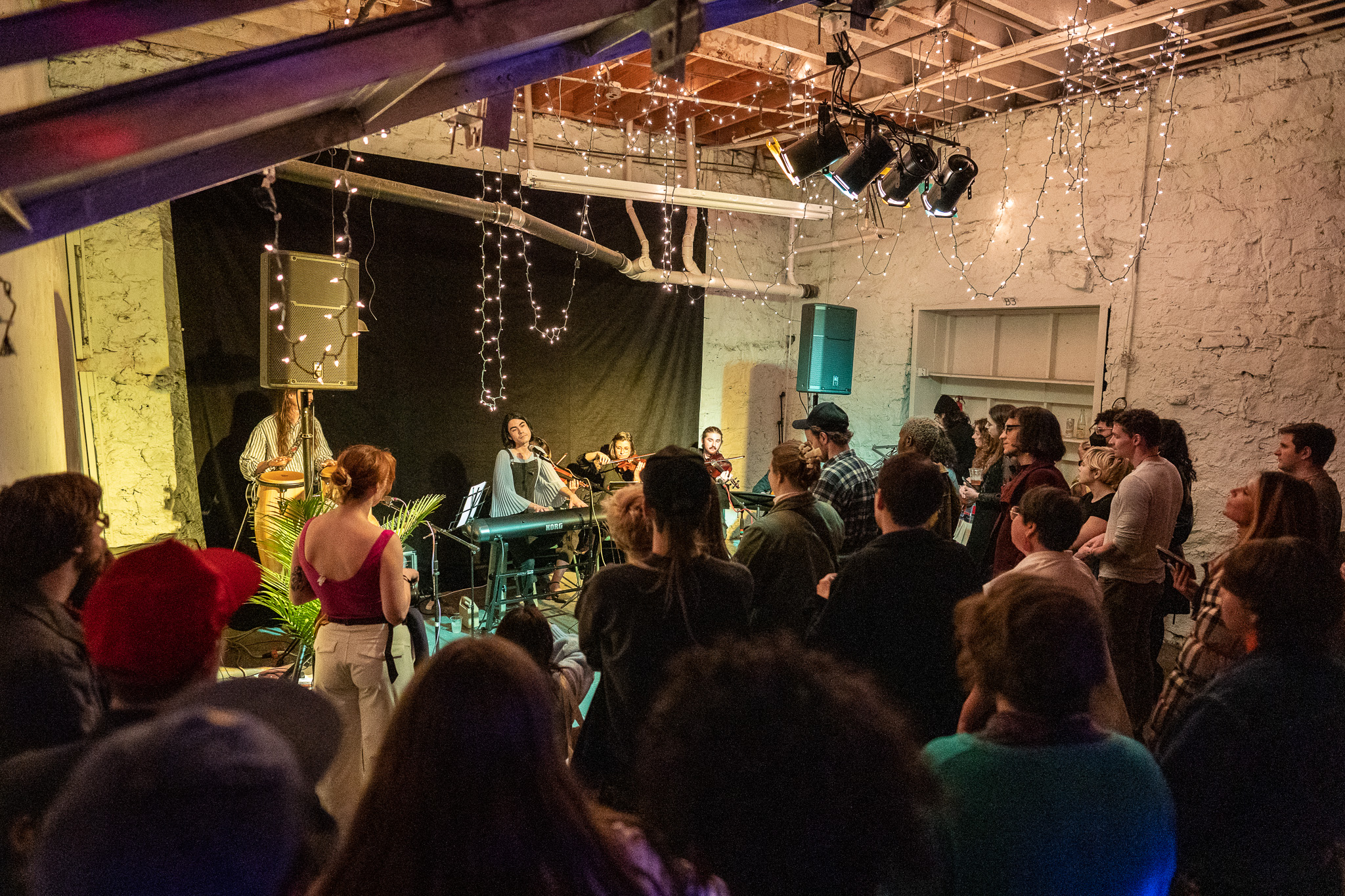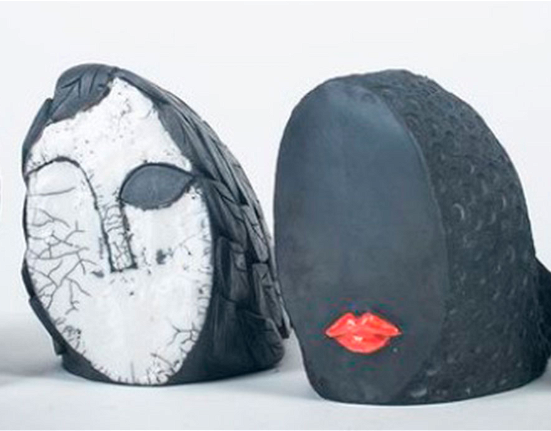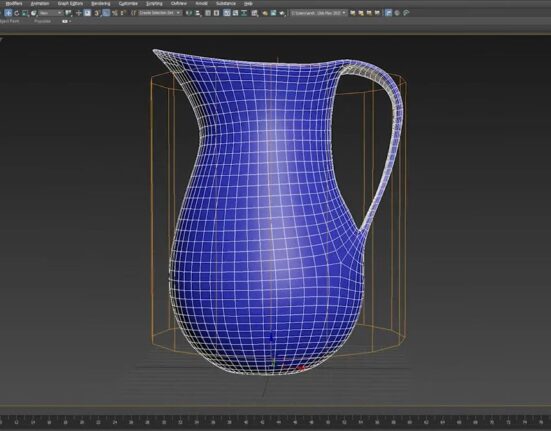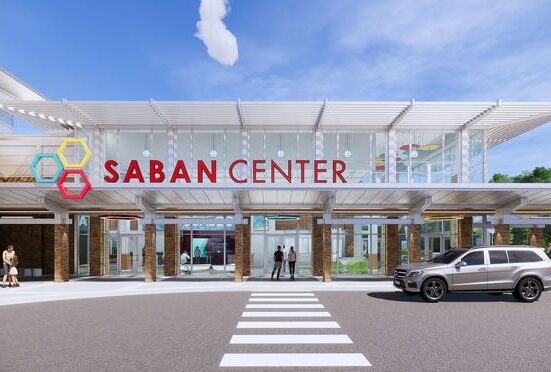Since 2017, Willow Goldstein has spent her time cooking up the Bakery Atlanta. But the result isn’t pastries or sweets like the name suggests. Instead, the Bakery Atlanta is a haven for the city’s art scene: a collective of artists, curators and administrators that host and produce galleries and events.
Goldstein, the founder, owner, operator, and creative director of the Bakery grew up in Atlanta before heading to Boston to study co-op experiential education at Northeastern University. From Boston, she moved to New York and continued working in arts administration and education.
In 2016, she returned to Atlanta, drawn to the city’s “constant juxtaposition.” By then, her hometown had become a beacon for people who didn’t fit into the South, which reminded Goldstein of her time in Brooklyn.
“It’s a puzzle I can’t solve,” Goldstein said about the city. “As long as I can’t solve it, which will probably be forever, I’m going to continue engaging with it.”
But she saw a need for better arts and culture connectivity in Atlanta. At the time, Goldstein said the art scene was “very siloed.” Goldstein wanted a space to create art platforms and collaboration between artists. Then, in 2017, she found a 23,000-square-foot warehouse set for demolition on Warner Street in southwest Atlanta.
Soon, the Bakery Atlanta was born. Artists flocked to the space immediately, Goldstein said, ready to volunteer to revitalize the warehouse and put together programming and events.
Amanda Norris, the assistant director of the Bakery Atlanta’s nonprofit and executive assistant to Goldstein, was one of those early attendees. She grew up in a small town in Georgia before heading to Georgia College, a public liberal arts university in Milledgeville. Norris moved to Atlanta on New Year’s Day 2017 and got involved in the art scene through DIY magazines.
She went to the Bakery on its opening day in the fall of 2017 and said it was “unlike anything I’ve ever seen.”
Since then, Norris has worn a “ton of hats.” She invented the community manager role, started the internship program, and became the director of programming. Norris and Goldstein worked together as the Bakery moved locations.
Goldstein called the first warehouse a “three-year experiment.” It proved successful, but the space was still set for demolition. In 2019, she found a new location at the Underground Atlanta, but the onset of COVID-19 in 2020 halted the project. At the start of 2021, the Bakery found a studio space at Jefferson Station in East Point as well as a retail storefront in South Downtown.
The Jefferson Station lease ended in 2022, but the South Downtown location is still active, running events like collage night, figure drawing, immersive dinner parties, and gallery exhibitions.
“The Bakery was really determined by the people who showed up and did something there,” Norris said.
The nonprofit director said if people are passionate about doing something, the Bakery will make it happen.
Nora Holt joined the Bakery in January 2021 as an art student at Georgia State University. She heard the collective needed volunteers to revamp the South Downtown location, and Holt wanted to “kind of learn that world as I was finishing my degree.”
She started off volunteering where needed, painting walls, and helping make over the space. Holt said she loved it.
“I kept coming back,” Holt said.
The art student saw it as a chance for an internship, too. Norris and Goldstein added her as a gallery team member and “taught her everything about running a gallery.” Most importantly, Holt said the collective helped her find a place after feeling like an outsider in her hometown of Conyers.
“I was trying to find my place, and that’s exactly what I found in Atlanta and with the Bakery,” Holt said. “As soon as I got to the Bakery, I felt accepted; I felt included.”
Since its inception, the Bakery has made it through several location changes and a global pandemic. But Goldstein knew the continued success of the collective would create some changes.
When she was contacted about available space on North Highland Ave. in Poncey-Highland, Goldstein knew her next step: The Supermarket, a 12,500 square-foot multi-use arts complex specializing in exhibitions, education, and entrepreneurship.
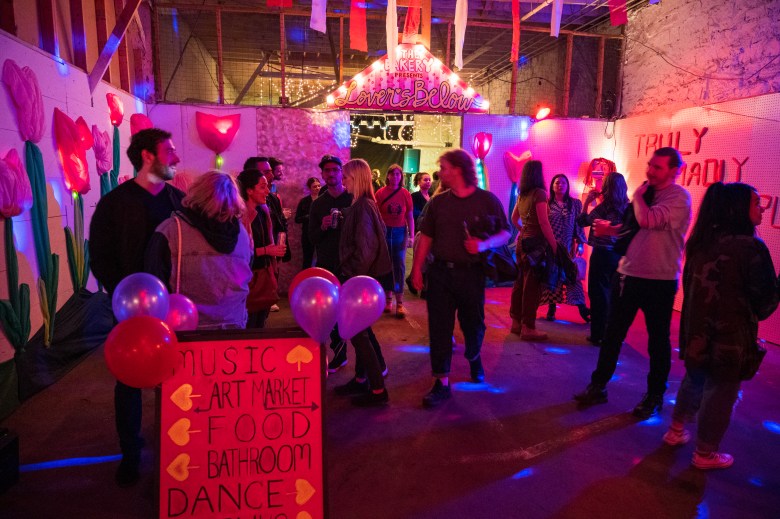
(Photo courtesy of the Bakery Atlanta.)
The Supermarket is taking over a portion of the shuttered Highland Row Antiques retail space. The long-standing 15,000-square-foot shop shut down at the end of 2022 after nearly two decades of business, citing a nearly “450 percent increase in rent” from new owners.
Goldstein secured the lease to the lower portion of the space on Feb. 1, marking a major investment for the artist group. It also marked a change for the Bakery Atlanta. The Supermarket is run together by the Bakery Atlanta nonprofit and the company Two Trees Studios.
The Bakery became a nonprofit in 2023 as part of a transition that could help the group get more funding and grants.
“Before being a nonprofit, the Bakery was a flexible thing,” Goldstein said. “To be a nonprofit would change the structure, timeline, ability to pivot.”
The nonprofit and the company are under different names, but the same people are behind each entity. Goldstein made the split for logistical reasons: the new nonprofit will be the anchor tenant and programming partner of the space, while Two Trees Studios holds the lease.
Norris said the massive space is too much for a brand new nonprofit to take on, but the Bakery as a company has been around since 2017 and can sign a lease. Still, the roles blend. Norris and Goldstein wear many hats across the nonprofit and company.
The new art space is a huge undertaking for either entity, with construction, permitting, and several business needs. It also comes with complications.
As a venue for music, theater and performing arts, Goldstein plans to offer concessions, primarily food and beverages. But there is no clear path to get a liquor license for the space, something that could take away what Norris calls a “key revenue stream.”
“Long story short, getting an alcohol license as an art space is hard,” Norris said.
It’s particularly difficult when, as Norris described, the Supermarket is doing something “nobody has done before.” There is no designation in the city code for a multi-use arts complex featuring galleries and performances.
The closest designation the Supermarket can use is a convention center zoning, which has something called a “distance requirement.”
The Atlanta City Code states: “No license hereunder shall be issued for any location where alcoholic beverages are sold whose proposed boundary line is within 300 feet of any private residence.”
The Supermarket at 628 North Highland Ave. NE directly backs up to a strip of homes on Cleburne Terrace, not complying with the distance requirements.
The Bakery would have to get a distance waiver, which can only occur through a city ordinance drafted by a sitting Atlanta City Council member that is passed and approved by the mayor. But the process, Goldstein and Norris said, is at a standstill.
Goldstein credits this in part to issues with the Poncey Highland Neighborhood Association, a nonprofit composed of residents and business owners in the area. Goldstein and Norris first presented the distance waiver request at a May 2023 meeting.
The neighborhood association has yet to vote on it, though. The topic has been deferred at meetings since the first presentation. A representative from the association said there was some hesitation around the original request, which would link the exemption to the property in perpetuity — meaning, the space would have a distance exemption regardless of the tenant.
The representative acknowledged there is no liquor licensing category to match Goldstein’s need but stressed the neighborhood association is purely advisory. While members can signal approval or disapproval for something, they have no official authority on legislation. Any decision would fall on the area’s City Council representative.
Atlanta District 2 City Councilmember Amir Farokhi said he is still waiting on word from the neighborhood association. He wants to ensure the neighborhood is comfortable with a distance waiver.
The councilmember stressed his support for a space like the Supermarket, though.
“Arts and culture venues like the Bakery are an asset to our city, but in densely populated parts of town, we have to find ways to manage the coexistence of residents in the close proximity to event venues,” Farokhi said.
Without a clear path forward, the liquor license process for the Supermarket is at a standstill. Goldstein has hired a lawyer to help with the situation, but she said any progress will take months to make official.
Still, the Supermarket is set to open in 2024 with or without a liquor license. On Feb. 9 and Feb. 10, it will host an open mic and pop-up party in the new space called “Lover’s Below,” which will act as a “sneak peek of what’s to come.”
The party will feature an art market, food, live music, dancing and performance. Notably, it will not feature alcoholic beverages.

